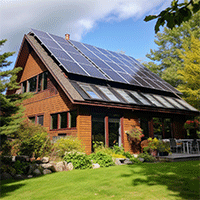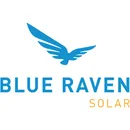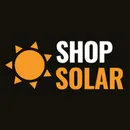Washington solar incentives, tax credits and rebates
Resources for going solar in 2023

Washington doesn’t have many statewide residential incentives for going solar. Currently, it only has two: a 100% exemption for sales and use tax on solar systems that are 100 kilowatts or less, and a low-interest loan program for low-income households.
After federal tax credits, the average system is $18,830 in Washington, which is more expensive than in many other states. Systems in the Northwest generally tend to cost more on average, though. The national average for a solar system is $16,715.
Key insights
- You can take advantage of a solar tax break and loan program in Washington.
- The average federal tax credit value is $8,070 in Washington.
- Washington residents save an estimated $10,846 over 25 years by going solar.
Solar incentives in Washington
The federal solar investment tax credit (ITC) can help offset much of the cost to go solar. If you install a residential solar panel system by the end of 2032, you will receive a federal income tax credit equal to 30% of the system's total cost.
The ITC drops to 26% in 2033 and 22% in 2034.
For example, in Washington, the typical solar system costs around $26,900. With the ITC, you would get a $8,070 credit on a system of that price when you file your taxes. All you need to do is complete Form 5695. The credit is nonrefundable, however, so it rolls over to the next tax year if your credit exceeds your tax liability.
The Washington State Housing Finance Commission also offers low-interest loans for solar projects to low-income homes. There’s also a 100% sales and use tax exemption on solar systems that are 100 kilowatts or less.
» MUST-KNOW: The tax benefits of owning a home: must-know deductions and secrets
More solar incentives in Washington
| Incentive type | Incentive amount | Applicable sectors | Administrator | Available statewide | |
|---|---|---|---|---|---|
| Renewable Energy Sales and Use Tax Exemption | Sales tax incentive | 100% of sales tax | Residential, commercial | Washington State Department of Revenue | |
| Evergreen Sustainable Development Standard for Affordable Housing | Green building incentive | Varies | Residential, multifamily residential, construction, government, installers/contractors, integrators | Washington Department of Commerce | |
| Clark Public Utilities Solar Energy Equipment Loan | Loan program | Up to $30,000 | Residential | Clark PUD | |
| WSHFC Sustainable Energy Program | Loan program | Up to $1 million | Multifamily residential, low-income residential, construction, nonprofit, schools, installers/contractors, agricultural, institutional | Washington State Housing Finance Commission | |
| Energy Efficiency and Solar Grants | Grant program | Up to $250,000 per entity | State, local and tribal government, schools | Washington State Department of Commerce | |
| Tax Abatement for Solar Manufacturers | Industry recruitment/support | 43% reduction of state's business and occupation tax | Industrial | Washington State Department of Revenue |
What to know about net metering in Washington
When your system produces more energy than you can use, you have two options. You can sell it to the power grid through net metering, or you can store it using a solar battery.
With net metering In Washington, you’re paid for the excess electricity you send to the grid with credits on your electricity bill. Each credit is typically valued at the full retail rate, which means you get the same value for the excess electricity as you would pay for electricity from the utility company. Credits roll over each month until March 31.
It’s a great way to balance out what you put in and take out of the grid. For example, Kimbal in Friday Harbor said, “Our electric utility, OPALCO, supports net metering, so we now offset 100% of our yearly electric-grid consumption.”
As for how long it takes to get set up, Daniel in Auburn said that “the timeline from initial order to completed install and utility interconnect was about three months.”
» GREENEST STATES: Washington ranks No. 2
Solar resources in Washington
Below are some additional resources that can guide you through transitioning to solar in Washington.
- Solar Washington
- Washington Utilities and Transportation Commission renewable energy incentives
- Washington State University Community Solar Expansion Program
- Seattle City Light solar power
- Washington Solar Energy Industries Association
- Puget Sound Energy — Renewable Energy System Incentive Program
» GUIDE: Solar panel installation
Find solar companies in Washington
Compare popular solar companies available in Washington below. Read our guide to finding the best solar companies for more.
| SunPower | Blue Raven Solar | ShopSolar | Sunrun | ||||
|---|---|---|---|---|---|---|---|
| Primary | SunPower | Read reviews | Customer Ratings 4.3 | Free quote | Payment options
Cash, loan, lease
| Warranty
10 to 25 years
| |
| Primary |  | Blue Raven Solar | Read reviews | Customer Ratings 4.7 | Free quote | Payment options
Cash, loan
| Warranty
25-year manufacturer warranty, plus a 10-year workmanship warranty
|
| Primary |  | ShopSolar | Read reviews | Customer Ratings 4.7 | Free quote | Payment options
Cash, loan
| Warranty
Varies
|
| Primary |  | Sunrun | Read reviews | Customer Ratings 4.1 | Free quote | Payment options
Cash, loan, lease
| Warranty
25 years
|
FAQ
Can I get solar panels for free in Washington?
There are no programs for free solar panels that we’re aware of in Washington. You can lease or enter a PPA with little to no upfront costs, though.
» FREE SOLAR PANELS: Are they really free?
How can I pay for solar panels?
One approach is an upfront purchase, which lets you enjoy full ownership and long-term savings. Alternatively, solar loans allow you to borrow the necessary funds and repay them over time with interest.
Leasing and power purchase agreements (PPAs) offer accessible choices with minimal upfront costs. Leasing involves renting the equipment, while PPAs let you purchase the generated electricity at a fixed rate.
» SOLAR PANELS: Lease vs. buy
How much can I save with solar panels in Washington?
In Washington, the average savings is $10,846 over 25 years. Even if you don’t generate 100% of your energy needs, you can still save a lot of money compared with traditional utility bills.
Are there any commercial solar incentives in Washington?
Yes, Washington offers industry recruitment and support, a sales tax incentive, a green building incentive and a loan program for businesses that want to go solar.
» MORE: Commercial solar panels
Are there any disadvantages to going solar in Washington?
Some areas of the state get very little sun, so you may not be able to produce enough energy to make it worth it where you live.
» MORE: Solar energy pros and cons
Is my HOA allowed to restrict solar panels?
Homeowners associations (HOAs) in Washington are not legally permitted to prevent the installation of solar panels as long as certain conditions are met.
Bottom line: How much are solar panels in Washington?
In Washington, the cost of a solar energy system averages $18,830 after accounting for tax credits, which is higher than the national average of $16,715. However, the state offers some incentives to assist with going solar. These incentives include a 100% sales tax exemption and low-interest loans. Even better, the state has a net metering program, an attractive option for homeowners looking to maximize their solar investment.
The ConsumerAffairs Research Team conducted an in-depth analysis to determine how much it costs to go solar in Washington and the average solar costs in other states.
Solar costs: Washington vs. nearby states
| Upfront cost* | Typical system size | Average cost per watt | ITC value (30%) | Payback period** | Estimated net savings | |
|---|---|---|---|---|---|---|
| Washington | $26,900 | 10 kW | $2.69 | $8,070 | 16 years | $10,846 |
| Oregon | $24,700 | 9.5 kW | $2.60 | $7,410 | 14 years | $23,058 |
| Idaho | $26,000 | 10 kW | $2.60 | $7,800 | 14 years | $11,478 |
| Utah | $21,440 | 8 kW | $2.68 | $6,432 | 14 years | $10,202 |
Article sources
- DSIRE, “ Washington Solar Programs .” Accessed September 14, 2023.
- EcoWatch, “ How Much Do Solar Panels Cost in Washington? ” Accessed September 14, 2023.
- United States Environmental Protection Agency, “ Summary of Inflation Reduction Act provisions related to renewable energy .” Accessed September 14, 2023.
- Solar Energy Industries Association, “ Washington Solar .” Accessed September 14, 2023.
- Washington State Legislature, “ Governing documents—Solar panels. ” Accessed September 14, 2023.
- Washington Utilities and Transportation Commission, “ Net Metering .” Accessed September 14, 2023.
You’re signed up
We’ll start sending you the news you need delivered straight to you. We value your privacy. Unsubscribe easily.
